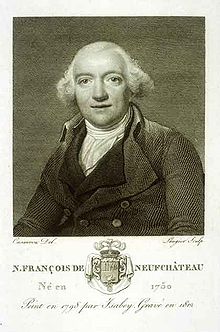Decadic cult
The cult of the decade (French: Culte décadaire ) is one of the revolutionary cults of the French Revolution. It was started - in the course of the de-Christianization efforts in the First French Republic - in 1793/94 (= year II of the French revolutionary calendar ).
2. Republican calendar
The calendar law of 4th Frimaire II (November 24, 1793) provided for a decimal division of time with the beginning of year III (September 22, 1794). One wanted to use the calendar as a political instrument and manifest the break with Christian culture in the calculation of time by abolishing the Gregorian calendar . For example, it should replace Sunday as a day of rest. The week was replaced by the decade of ten days, three decades made one month. The ten days of the decades were counted. As a result, there was only one day off every ten days, the Feast of Reason , plus a few public holidays at the end of the year in September. The traditional Christian holidays (Christmas, Easter etc.) were replaced by revolutionary festivals .
On July 19, 1798, after the final conquest of the left bank of the Rhine (see coalition wars ) , François Joseph Rudler announced this fundamental change in the previous world as a catalog of virtues in what is now Germany . During a transition period, only the administration (“usage civil”) and citizens who were consciously pro-revolutionary ( vrais citoyens ) adhered to the decades; they were no longer mentioned in the directorate's constitution and sank into insignificance. In official documents such as notarial contracts, double dating was often done.
François-Martin Poultier designed a 44-part collection of speeches for use at the festivals of the decade, which were to appear in deliveries of two copies each. The Mainz republican and clubist Georg von Wedekind translated three deliveries into German during his exile in Strasbourg, but after that there was no support for this project and the translations were discontinued.
In the directorate
With the coup d'état of the 18th Fructidor V , a more radical government re-established itself. With the decree of the Directory of April 3, 1798 ( arrêté du 14 germinal an VI ), an increased implementation of the revolution calendar and renewal of the decade celebrations were ordered.
From 17th Thermidor VI (4th August 1798) the cult of the decade also became law, and the decadi was for the first time generally established as a day of rest. Administrative regulations of 13th Fructidor VI assigned him the date for the civil marriage as part of the administrative celebrations. From the 23rd Fructidor VI (September 9th 1798) the Dekadi became valid for all areas of society. The new cult was enforced by missionary messengers and government coercive measures. The driving force behind this was Interior Minister Nicolas-Louis François de Neufchâteau .
With the Concordat of 1801 and the entry into force of the Organic Articles , the anti-clerical politics of the revolutionary era came to an end. On January 1, 1806, the cult of the decade was finally abolished.
Georg Friedrich Rebmann praised the revolutionary calendar with his cult of the decade
"As an expression of the courage of the French people to assert their freedom against the whole world."
literature
- Albert Mathiez : La Théophilanthropie et le culte décadaire 1796–1801. Essai sur l'histoire religieuse de la Révolution. F. Alcan, Paris 1903 (also: Paris, university, dissertation, 1903).
- Wolfgang Hans Stein: Revolutionary Calendar, Dekadi and Justice in the annexed Rhineland, 1798–1801. In: Francia . Vol. 27, No. 2, 2000, pp. 139-175 .
- Georg May : The right to worship in the diocese of Mainz at the time of Bishop Joseph Ludwig Colmar (1802-1818) (= canonical studies and texts. Vol. 37). Volume 2. Grüner, Amsterdam 1987, ISBN 90-6032-290-8 .
Individual evidence
- ↑ Franz Dumont , Ferdinand Scherf , Friedrich Schütz (Ed.): Mainz. The history of the city. von Zabern, Mainz 1998, ISBN 3-8053-2000-0 , p. 358.
- ↑ Joseph Hansen : Sources on the history of the Rhineland in the age of the French Revolution 1780-1801. Volume 4: 1797–1801 (= publications of the Society for Rheinische Geschichtskunde. 42, 4, ISSN 0930-8822 ). Hanstein, Bonn 1938, p. 922 ff.
- ↑ François-Martin d'Poultier Elmotte: Discourse décadaires pour toutes les fêtes de l'année républicaine. sn, Paris Ans II – III.
- ↑ citizens Poultier: Decade talk to all parties of the Republican year. Translated by Citizen G. Wedekind. Treuttel, Strasbourg In the 3rd year of the Franconian Republic.
- ↑ Georg May: The right to worship in the Diocese of Mainz at the time of Bishop Joseph Ludwig Colmar (1802-1818). Volume 2. 1987, p. 239.
